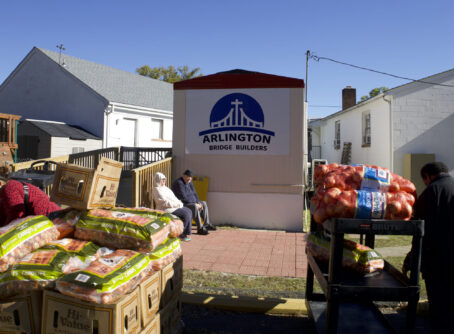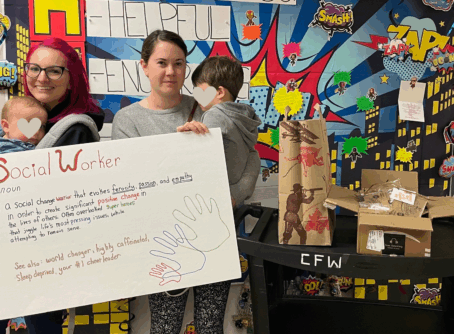Keynote Address by Stanley Carlson-Thies, January 13, 2025. Recordings of the summit, including this keynote address, can be found here.
“More faith, more flourishing”
This title is inspired by the book written by Byron Johnson a dozen years ago, called More God, Less Crime: Why Faith Matters and How It Could Matter More. Byron, who directs the Institute for Studies of Religion at Baylor University, has for decades dedicated himself to empirical research on the personal and social consequences of religious commitment—the difference it makes to people and to society when individuals and institutions are inspired and guided by some religion. That religious difference is largely, though not always, positive—that’s why his book has the title “More God, Less Crime.” Byron’s first major dive into this area of research was a review he co-authored in 2002 that surveyed the growing body of research on the pro-social effects of religion. That review was called “Objective Hope: Assessing the Effectiveness of Faith-Based Organizations.”
Consider that date, that time: the year 2002, two decades ago. What “Objective Hope” reviewed were research studies from the 1990s in which scholars were showing how important religious practices and faith-based organizations are—how important religious practices and faith-based organizations are not only in shaping the aspirations and actions of individuals but also in prompting programs of assistance to people in need and to shaping and energizing the everyday lives of neighborhoods, cities, and rural areas.
Also in the 1990s, researchers and journalists and Washington, DC, think-tank scholars were discovering that many large-scale government social programs were not yielding the positive outcomes that were expected. So, on the one hand, new evidence was showing positive social outcomes from community-based organizations—particularly from houses of worship and other faith-based programs. And on the other hand, the evidence showed that conventional government programs and methods of delivery of services were falling short.
John DiIulio, a political science professor at the University of Pennsylvania, called the reports on the positive individual and social consequences of religion “faith-factor” research. And he and other social-policy entrepreneurs began asking this very consequential question: if the usual government social programs were doing poorly but these other programs—programs rooted in particular communities and typically inspired and shaped by some religion–often had good outcomes, shouldn’t the government redesign its social assistance efforts? Shouldn’t the government turn from supporting large, secular, bureaucratic social service providers and instead find ways to partner with these newly discovered, often religious, often small, often unstandardized faith-based and community-based organizations?
At around the same time, the U.S. Supreme Court was shifting from a strict-separationist interpretation of the First Amendment to a neutrality interpretation. This entailed a radical shift from a requirement that the government not “aid religion” to a new requirement that the government not obstruct the exercise of religion and that it not deny funding to faith-based organizations simply because they are religious.
In the middle 1990s, these various trends came together to create what came to be called the faith-based initiative. Faith-factor research showed the social good of religion. Studies of conventional government social programs cast doubt on their effectiveness. The Supreme Court’s change in First Amendment interpretation required that social service providers that are overtly religious in inspiration and identity no longer be excluded from funding. Now was the time to put into practice that idea of partnership between government and faith-based and community-based organizations.
The big first step was Charitable Choice legislative language that President Bill Clinton signed into law several times in the mid- and late-1990s. Then President George W. Bush, starting in early 2001, decided that all federal social programs should support and collaborate with innovative and effective faith-based and community-based programs. He created the White House Office of Faith-Based and Community Initiatives with John DiIulio as its first director. I was honored to serve under him.
Succeeding presidents have also committed to this line of federal policy innovation, each in its own way. Whether Republican or Democratic, the succeeding administrations have had a White House Office or advisor of faith-based initiatives, faith-based centers in a dozen major agencies, and regulations that require equal access to federal funds by faith-based organizations. Sometimes agencies have made special efforts to redesign their programs to maximize their engagement with faith-based and community organization. And Congress has expanded the tax incentive to encourage taxpayers to donate their own money to these organizations to help them fund their programs whether or not they also partner with government.
That, briefly, is the trajectory and importance of the faith-based initiative. It seems a world different from the current preoccupations of political debate and public policymaking. Now the big issues are immigration and border control, inflation and tariffs, government economic incentives, the national security dangers from being coupled too tightly with China, and so on. That is, not so much attention to social policies, volunteerism, faith-based organizations, and civil society. The battle is between populism and progressivism, two political stances that are concerned more with the size and activities of government than with the well-being and good works of faith-based and community-based service organizations. And progressives are largely dismissive of or opposed to religion’s role in society while populists applaud religion but seem often to regard it as simply a cultural matter or a marker of group identity.
Well, without debating populism and progressivism, and after acknowledging that government must be concerned with far more than only the delivery and impact of social services, I want to reaffirm and to urge that now, just as thirty years ago, “more faith, more f lourishing.” Still, now, the well-being of our society requires the government to carefully protect the free exercise of religion, to protect the religious freedom needed by faith-based organizations and houses of worship, and to partner with these organizations to expand the good that they do in society.
This is not a plea that the federal government should force a dose of religion on everyone. Instead it is a plea that the government should strongly protect religious freedom. When faith-based organizations are free to be religious when they partner with government, then people needing help have choices, and they will find organizations located where they are, that they trust, and that are compatible with their beliefs and values. Protecting religious exercise protects a prime source of care for others. Religion, most of the time, calls its adherents to self-critique, respect for others, and a readiness to go the extra mile. It supports volunteering, donating, direct service, and social and political action to challenge social injustice. It sustains care and action for the long-haul, beyond just a momentary impulse to do good.
Protecting institutional religious freedom—that is, the ability of faith-based organizations and houses of worship to be true to their respective religions and not to have to bend always to secular standards—protecting their religious freedom makes them “free to serve” in their distinctive ways, serving everyone yet offering their distinctive ways of serving.
I should add that a flourishing array of faith-based and secular organizations and a f lourishing civil society that is not micromanaged and homogenized by excessive government—all of this is vital to our nation that is so religiously and ideologically diverse. For, when people act via civil society organizations, they are able to put their convictions into practice without requiring everyone else to accept their values and views. Freedom for faith-based organizations, far from being an instance of theocracy, is the foundation for a full civic pluralism.
So, then, how can our nation, thirty years after the start of the faith-based initiative, promote the flourishing of religion, and especially, the flourishing of faith-based organizations and of their service to others?
I will propose five specific actions, and then close with two brief stories that may surprise you.
Action 1. A recommendation to journalists and scholars. Do not neglect the faith factor, or the role of faith-based organizations in society, or the importance of the faith-based initiative, even if the current attention-getting struggles are about the size of government, the amount of its spending, and efforts to get it under control.
Action 2. Recommendations to the courts. For the sake of the diverse convictions of the citizens and so that faith-based organizations are not excluded again from partnerships with government, the courts need to rule that religious freedom is no less vital than protecting LGBTQ rights. And, as the courts continue to protect the role and practices of faith-based organizations as partners with government, they must be careful to equally protect the religious rights of people seeking help from government-funded faith-based organizations.
Action 3. Recommendations to Congress. Whether or not the courts force the simultaneous protection of religious freedom and LGBTQ rights, this is something that Congress ought to take up right away. The name is Fairness for All: protecting in federal civil rights law the rights both of those committed to progressive sexuality and those committed to morally conservative sexuality. And when Congress takes up tax reform, it should enact more-generous tax incentives for charitable giving. Such incentives are not a loss to the Treasury but rather an investment in the health of civil society.
Action 4. Recommendations to federal officials—and also state and local officials—who work in the faith-based initiative. You should not let this initiative be narrowed to just inviting more private groups to apply for government grants and contracts. The cutting edge, the growing edge, the liberating edge, is to insist that government policies and practices fully respect the freedoms needed by faith-based social service organizations and by houses of worship. Keep the playing field actually level and the natural outcome will be new and additional partnerships. But if faith-based organizations instead are only invited to participate in funding practices and government program designs that do not accommodate their uniqueness, then the government will not gain more innovative and effective partners in service.
Action 5. Recommendations to faith-based organizations. Have courage and be active! Pay attention to the public policy environment around you, watching to see whether the freedoms you need are being narrowed. Speak up when you run into illegitimate restrictions. Go to the government’s faith-based initiative officials and urge them to become your defenders. And adopt those essential organizational practices that identify your organization and its distinctive practices as authentically based in religion and thus entitled to all of the protections for religious exercise that exist in the law and in our constitutions. Institutional religious freedom is protected only when you are informed, courageous, and active.
I will end with two brief stories. We are all watching with horror and alarm the wildfires in the Los Angeles area. I have no doubt that the many and diverse faith-based organizations and people of faith in Los Angeles are responding with bravery and compassion to this great emergency that has engulfed the area.
As that heart-breaking drama is unfolding in Los Angeles, I want to draw your attention to a quiet bit of news from Los Angeles that was published just before Christmas. The Los Angeles Homeless Services Authority announced, on December 23, that 50 small grants were awarded to small organizations, including churches and faith-based charities, that provide services to homeless persons and families The money will help these small organizations develop their financial capabilities and their internal management so that, if they choose to, they can compete successfully for major funding from the City that will enable them to greatly expand their services.
Why would the progressive City of Los Angeles decide to award money to expand the work of faith-based organizations? The Agency says that its efforts to address the large crisis of homelessness in the City will become more effective when those persons and families needing housing have more choices, making it possible to connect with an organization that they know and trust. More partnerships with faith-based and community-based organizations is the way to improve the City’s services.
Reading about those awards reminded me about expanding partnerships in another place that may also seem unlikely—another place all the way across the continent. New York City, it turns out, has a Mayor’s Office of Faith and Community Partnerships. This faith-based office, according to its mission statement, “works to build bridges among City government, diverse religious communities, and nonprofit organizations to better serve all New Yorkers.” The office “assist[s] in developing and implementing policies that contribute to the social well-being and overall quality of life in the City of New York.” Pastor Gilford Monrose, who heads that office, was unable to be here in person today but has requested the video recording of this summit on government and faith-based organizations.
New York City, just like Los Angeles and every other place in the United States, is a place of diverse religious communities along with secular people. New York City, like everywhere else in America, needs diverse services and to protect the freedom to serve its many faith-based organizations. That’s what the faith-based initiative is all about. It is an initiative designed to put government on the side of, instead of against, faith-based services, because, as I said at the start, “more faith, more flourishing.” Thank you.
Stanley Carlson-Thies is the Founder and Senior Director of the Institutional Religious Freedom Alliance (IRFA), a program of the Center for Public Justice.



